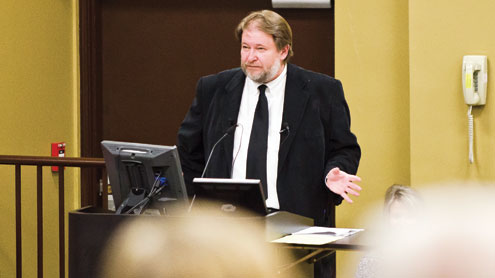 Pulitzer Prize-winning writer and journalism professor Rick Bragg told a packed room in Graves Hall the power of story, which he said was the best way to change the world.
Pulitzer Prize-winning writer and journalism professor Rick Bragg told a packed room in Graves Hall the power of story, which he said was the best way to change the world.
Bragg was honored by UA’s graduate program as the speaker at their annual Last Lecture series, for which a professor on campus is nominated by their students to give on stage the lecture they would present if they knew it was the last time they’d be able to speak to a group of students.
Bragg’s lecture, called “So They Don’t Forget,” focused on his career as a storyteller and the power that people in that field could wield.
“I believe that I have one value here, and that value is to teach writing in a way that brings injustice, cruelty, thoughtlessness, meanness and stupidity to light,” Bragg said. “I do not teach that as the point of a sword, I don’t teach it to encourage people to go after the wrongdoers, I teach it to get people to write about life’s victims. The best writing is about people in trouble, and that’s what we talk about a lot in class.”
He said the title of his lecture came from one of the defining moments of his career: He was in New Orleans covering a high murder rate in the city during that time. There, as he apologized for the questions he had to ask a mother whose son was killed by a stray bullet, the woman told him something that stuck with him for the rest of his career in journalism.
“She told me, ‘People forgets if it ain’t written down,’ and it’s never been any more complicated than that for me,” Bragg said. “If this were the last thing I got to say to people who will write and who will tell stories and who will point cameras at people, or who just walk around living, I’d say you forget if it’s not written down.”
Bragg also addressed the tragedy that Tuscaloosa has faced in the last year and the Pulitzer Prize that the Tuscaloosa News earned for covering it.
“I have written about misery and killing and dying in so many countries and so many places that I don’t even want to think about it anymore, but we have gone through a bad time here,” Bragg said. “The sky changed forever, or maybe, just the way we look at it.”
He said the newspaper deserved the recognition they’ve received, and he is proud to live in Tuscaloosa because of it, but, as a recipient of more than 50 significant literary awards during his career, he said they didn’t mean everything.
“Long after that award has lost its luster, the stories behind it will endure and prevail,” Bragg said. “I just believe that you change this world with stories. You make people care with stories. You make the world around us better by telling stories effectively, thoughtfully and maybe even beautifully. That’s all I’ve got.”
Before Bragg was introduced, the eight members of the Last Lecture selection committee, all students, said Bragg was selected from a pool of more than 250 nominations and was ultimately picked from a group of eight finalists, including the director of the Million Dollar Band, Kenneth Ozzello, and UA Vice Provost Hank Lazer, who teaches in the English department.
Brian Bristow, an MBA student and one of the members of the selection committee, also served in that capacity during the senior year of his time as an undergraduate at UA. He said the choice to nominate Bragg did not come easily, but he felt it was the right one.
“Given the quality of the nominations we received and all the research we did, realizing how impressive he was as a speaker and a professor, and how he’s made such a profound impact on the campus, when we realized the impact he could have, we knew he would be a great speaker,” Bristow said.
Bragg spoke to about 500 people in a crowded room in Graves Hall. Those who could not find a seat stood or sat wherever they could find an empty space on the floor. Bristow said the series normally reserves a larger room in Alston Hall, but scheduling conflicts necessitated the smaller location.
Even so, no one expected the size of the crowd that arrived.
“Even we were very pleasantly surprised at the turnout,” Bristow said. “The community really got behind it, embraced it. And it really reaffirms, for us, that we made the right decision”







